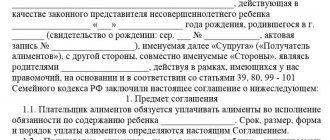According to the Bank of Russia, at the beginning of 2021, Russians received loans worth more than 17.6 trillion rubles . If you look at banking statistics, the debts of our compatriots can be divided into two large categories: consumer and mortgage. Today it is quite difficult to imagine a family without at least one loan, so the issue of dividing borrowed amounts worries many. Moreover, some marriages last less than the loan repayment terms.
Recently I received an interesting question: if a husband has a loan, can this money be written off from his wife’s account? Read the answer to it in this article.
Joint and several liability of spouses
The provisions of the Family Code (Chapter 45) state that each spouse is personally responsible for their obligations. However, creditors are not prohibited from demanding a share of the debtor’s property from common jointly acquired assets. Previously, it was assumed that the borrowed funds should have gone entirely to the needs of the family, so each spouse would have to answer. In addition, the spouses were jointly and severally liable if the debtor's assets were not sufficient to repay the debt.
The joint liability of spouses for debts implies their general obligation. A creditor who has not received payment from the borrower has the right to demand repayment from joint and several persons. That is, there is a situation when the husband’s debt is transferred to the wife.
But recently the situation has changed. Spouses can still be mutually involved in the fulfillment of obligations, but subject to certain conditions.
Allocation of the spouse's share to pay off the debt
If the husband has loan debts and his personal funds are not enough to pay off the problematic obligation, then the bailiff can initiate the allocation of the wife’s share. In practice, this rarely happens, but it is not impossible.
Everything is carried out strictly through the courts. Only property that is recognized as acquired in a joint marriage is taken into account. What exactly is considered such property is determined by Article 34 of the RF IC. In fact, this is everything except property received before marriage, inheritance and gifts.
Property registered in the name of children does not belong to joint property and cannot participate in the allocation of a share.
So, if we consider whether the wife is responsible for her husband’s loans or the husband for his wife’s debts, then in fact - yes. But exactly after the moment when the main borrower is declared insolvent. Then the bailiff can, through the court, allocate the property share of the second spouse and cover the debt with it.
Legislative justification
Not long ago, there was a practice of full joint liability for debts incurred during the marriage. That is, husband and wife had to answer to creditors almost equally, regardless of the purpose of the loan.
Interested parties, and they, as a rule, were banks, had the right to demand foreclosure on the family’s common property in the event of non-payments. To many, this situation seemed unfair. Moreover, if cases were considered when the husband’s debt is transferred to the wife or vice versa, provided that the other half spent the borrowed funds unlawfully.
Husband and wife are not responsible for each other's debts, although there are some nuances
The Supreme Court decision of March 16, 2021 abolished the presumption of joint payment of debts in relation to spouses. Tax and loan debt cannot be transferred to the wife or husband.
Banks no longer have the right to demand repayment from other family members. The debt is recognized as common only if it is proven that the borrowed funds were taken for the needs of the family. In this case, the accused party will have to provide facts and evidence about family expenses. Previously, it was assumed by default that loans received from the bank were considered as funds for general needs.
What is important to know when one of the spouses goes bankrupt?
Most citizens who have already filed for personal bankruptcy have children, husbands or wives. And now these families live happily: their descendants, in addition to the inheritance, will not receive thousands of debts, and creditors will not pursue them for the rest of their lives. But it is difficult for a person who has just found himself in a difficult situation to evaluate all the possible pros and cons of bankruptcy. There is little information on the Internet, and it is often false. The first thing a potential bankrupt should think about is to assess all the risks that the procedure carries and protect property. However, first the citizen is faced with another question: how will my bankruptcy affect my family? Wouldn't it be worse?
In what cases will your spouse have to pay your debts?
Changes in legislation provide an answer to the question of whether a spouse is responsible for her husband’s debts. The financial obligations of each party will not be transferred to other family members unless it is proven that the expenses were not personal, but joint, this also includes alimony and promissory notes. Also, no debt obligations arise if the marriage is civil, that is, not registered.
In accordance with the new edition of the interpretation of articles of the law, during a divorce, credit obligations are not equally divided unless they are considered joint. You won't have to pay for your ex-husband's debts either. In addition, bailiffs do not have the right to oblige a spouse to pay the debt of her husband, who took money to develop the business.
If the debtor died, leaving financial obligations outstanding, relatives, including the spouse, will be responsible for the payments only if they entered into an inheritance. Moreover, after the death of the borrower, the heirs pay the debt only to the extent of the assets received. If there was no fact of inheritance, then material obligations do not arise.
You will have to answer for the debts of the spouses if you take out a loan for family needs.
However, in some cases, the husband's debts will have to be paid. This possibility appears in the following cases:
- If the spouse is the husband’s guarantor under the loan agreement. The loan must be repaid to the bank on a general basis.
- If it is proven that the debts arose as a result of general family needs. An example is the requirements of public utilities for services.
If the spouse died
Now let’s look at whether the wife is responsible for her husband’s loans if he dies. In this situation, the inherited property includes not only monetary and other assets, but also debts, if the deceased had them.
All persons entering into an inheritance receive, in addition to the property, the debts of the deceased. Moreover, in exactly the same shares as indicated upon receipt of the inheritance. And if the spouse received, for example, ⅓, then she must pay a similar part of this obligation. If this is not done voluntarily, the bank or other owner of the debt has the right to go to court.









